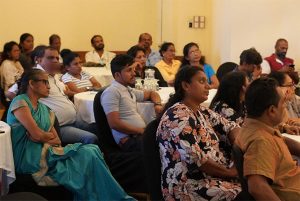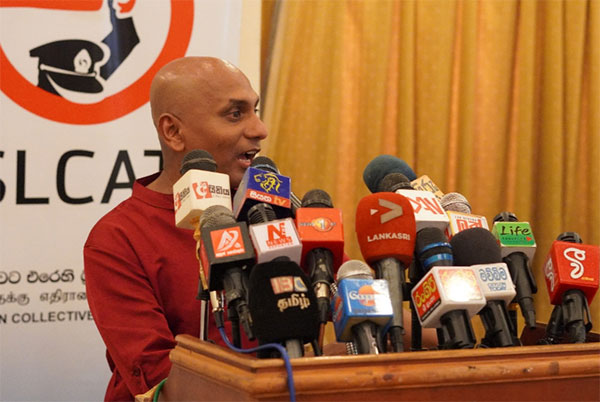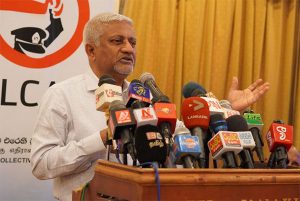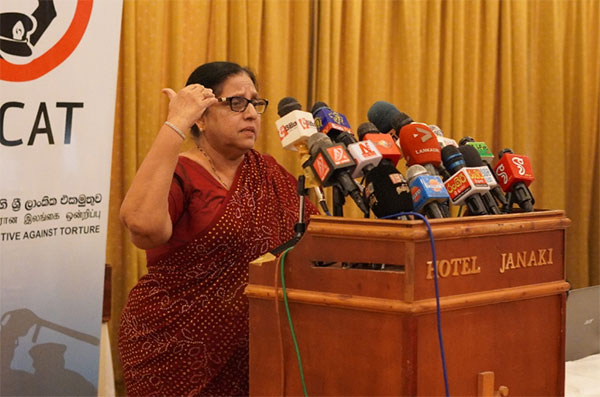
Sri Lanka Collective Against Torture held a seminar in Colombo on September 25 to discuss the Anti-Terror Bill that the government has published on the gazette. This bill was first introduced in March but later it was withdrawn due to protests from the civil society.
Opening the dialogue, Dulan Dasanayake, AAL, pointed out that the debate has two sides, those who want to completely abolish the Prevention of Terrorism Act (PTA) and those who want to introduce a new anti-terror law in line with the international standards.
“I was terrified when police arrested me in Kilinochchi and said that I would be held in custody for a long time. I knew it was not a mere threat because I had helped the families of many persons who were held under PTA,” said Ruki Fernando, a prominent human rights activist in Sri Lanka, addressing the seminar.

“The anti-terror laws restrict the rights of the suspects. The government has been using PTA to suppress people for 44 years. In 2018, the Good Governance government tried to introduce Counter-Terrorism Act to abolish the PTA. However, the government had to revoke CTA due to protests. When ATA was first introduced in March this year Sinhala society also rose against it. Before that, the protests were mainly from the Tamil community. After the Easter Sunday terror attack in 2018, PTA was used widely against the Muslim community.
“The definition of terrorism under this bill is too broad and anything can be interpreted as terrorism easily and enact this law against it. Until the case is heard, the suspect has to be in custody, even though ultimately, he or she is proven innocent.
“Police has wide powers under the ATA. Some say that ATA now published in the gazette is more lenient compared to the one introduced in March because of the facts like the death penalty has been abolished, however, the death penalty was not even in the PTA.
“Under the new ATA, similar to PTA, the detention orders can be issued only by the Ministry of Defense. According to the ATA introduced in March and later revoked, the power was vested into senior police officials.
“The major problem with the terror laws in Sri Lanka is that many of the offenses that are listed as terror acts under ATA can be punished by the existing general laws too,” Ruki Fernando said. He demanded based on the human rights perspective to repeal PTA and withdraw ATA. If absolutely needed, introduce amendments to the penal code to accommodate any essential concerns, but after wide consultations, or use temporary laws such as emergency regulations, he urged. He further demanded to stop using PTA and deliver justice for present detainees.

Prof. Rohan Samarajiva said that there are normal situations and extraordinary situations such as man-made disasters like the Easter Sunday terror attacks. “To face terrorism, we need special laws. However, those laws must be controlled by strict checks and balances. They should not be allowed to leak into normal conditions and to be used against civilians. In March, the National Movement for Social Justice proposed the Minister of Justice narrow down the definition of terrorism, including checks and balances strengthening the judiciary and completely removing Chapter 10 which has draconian measures.
“However, Chapter 10 remains in the new ATA. If the government wants such laws on a special occasion, the President has powers to do so under emergency Regulations.”
Dr. Nimalka Fernando said that countering terrorism must be considered within the framework of human rights. “Terrorism is a modern phenomenon the world experiences and suffers. Although we see terrorism, no one has a proper definition of the term terrorism. However, we cannot tolerate terrorism and we need laws to suppress it. Also, the community must have an alternative defense ideology and we identify it as community protection. Mere laws do not assure security and it was proven by the failure of PTA to prevent terrorism. Also, we need a strong legal framework to face terrorism. However, it must not be the repressive behaviour of the state. People have to sandwich between extremism and state terror. UN also urges us to abolish PTA and to introduce a standardized legal framework that safeguards human rights to fight terror.”

Dr. Nimalka Fernando also highlighted the need for addressing the social issues that contribute to extremism. She urged civil society to engage in advocacy together with the international community to pressure the government to further amend the Anti-Terror Bill and replace the PTA.
Ajith Parakum
